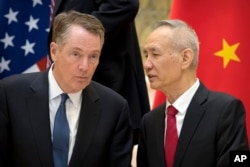President Donald Trump says there is no "magical date" for reaching a trade deal with China, suggesting again the March 1 deadline for new tariffs could be pushed up.
"I think the talks are going very well," Trump told reporters at the White House Tuesday. "I can't tell you exactly about the timing. The date is not a magical date because a lot of things are happening. We'll see what happens."
He called the trade negotiations "very complex."
Trump had set March 1 as the deadline for hiking tariffs on $200 million in Chinese imports from 10 to 25 percent if no trade agreement is reached.
He has since said that date could be put off if negotiators are close to a deal.
Talks resumed Tuesday in Washington between lower-level deputies from each side before senior-level talks — including Treasury Secretary Steven Mnuchin and U.S. Trade Representative Robert Lighthizer — take over Thursday.
Vice Premier Liu He, Beijing's top economic and trade negotiator, will again lead the Chinese side.
The White House says the talks will focus on "achieving needed structural changes in China that affect trade" with the United States.
Bloomberg News reports U.S. negotiators want China to commit to not depreciating the value of its currency.
A depreciated yuan makes Chinese goods cheaper on world markets compared to U.S. products.
The United States has long complained about what it calls unfair Chinese trade practices, including alleged theft of U.S. intellectual property, and demands U.S. firms turn over trade secrets to China if they want to keep doing business there.
China has said it is U.S. trade policies that are stifling its economic development.
Some analysts are confident a deal will be made before the March 1 deadline.
"Well, I think the reason that there will be a deal is because it's obvious that President Trump and (Chinese) President Xi (Jinping) both want a deal to be done, so at the end of the day they can order their negotiators to make a deal. So I think the politics will be the principal thing there," said Arthur R. Kroeber, managing director of GaveKal Dragonomics and Nonresident Senior Fellow - Brookings-Tsinghua Center.
Others are not so optimistic.
"I think you know Xi Jinping himself is the biggest vested interest when it comes to the Chinese economy,” said Elizabeth C. Economy at the Council on Foreign Relations, adding that Liu is very focused on internal reforms and may not be willing to risk "loosening his control over the economy."
Washington and Beijing imposed tit-for-tat tariffs on each other's imports last year before Trump and Chinese President Xi Jinping called for a 90 day truce starting on Jan. 1.
VOA's Mandarin Service contributed to this report.










